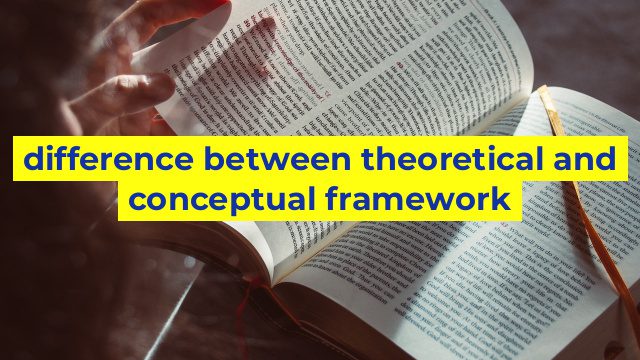The Difference Between Theoretical and Conceptual Frameworks
When conducting research, it is important to establish a framework to guide the process. The two most common frameworks used are theoretical and conceptual frameworks. While they sound similar, there are distinct differences between the two.
Theoretical Framework
Theoretical frameworks are built around pre-existing theories and concepts that are already established in the specific field of study. These theories and concepts have been researched, studied, and peer-reviewed by scholars for accuracy and reliability. The theoretical framework explains the relationship between different theoretical concepts, and how they may be applied to the research question or objective.
For example, a theoretical framework for a study on educational achievement might rely on established theories of social psychology and motivation. Researchers will identify key concepts like self-efficacy, outcome expectations, and self-determination theory within the body of research in these areas, and use the theoretical framework to show how these existing theories can be applied to their research questions.
Conceptual Framework
In contrast, the conceptual framework is more broad and exploratory in nature. A conceptual framework begins with the broader subject area, but instead of drawing on established theories or concepts, it identifies and defines the key variables or concepts of interest within that subject area. It may be used where there is no pre-existing theory available or consider the integration of multiple theories in a unique way.
For example, a conceptual framework for healthcare research might involve identifying and defining the key concepts to be considered in relation to healthcare outcomes, such as access to healthcare, quality of care, and health insurance coverage. By exploring these concepts and their relationships, researchers can build a conceptual framework that guides their research questions and helps to identify key factors that contribute to successful health outcomes.
Key Differences
One key difference between theoretical and conceptual frameworks is the level of specificity. Theoretical frameworks are more specific and narrowly defined, while conceptual frameworks are broader and more general.
Another difference is the source of the framework. Theoretical frameworks are drawn from pre-existing theories and concepts, while conceptual frameworks are developed de novo by the researcher(s).
Lastly, the purpose of the framework may differ. A theoretical framework aims to provide a basis for understanding and predicting phenomena in a given domain, while a conceptual framework aims to provide a way to explain and describe aspects of a phenomenon in a broader and more exploratory way.
In summary, both theoretical and conceptual frameworks play important roles in guiding research processes. While there are similarities between the two, it is important to understand the differences between them, so that researchers can choose the most appropriate framework for their specific research questions or objectives.
Table difference between theoretical and conceptual framework
| Framework | Theoretical | Conceptual |
|---|---|---|
| Description | Theoretical framework is a set of concepts, constructs, theories, and models that provide a structure for understanding the phenomenon under study. | Conceptual framework is a visual representation of the researcher’s understanding of how the variables in the study are related to each other. |
| Basis | Built on theoretical concepts and principles from relevant literature and established theories. | Built on the researcher’s own understanding of how the variables are related based on the problem statement and research questions. |
| Function | Used to develop hypotheses or research questions that guide the study. | Provides a framework for organizing and analyzing data and for testing relationships among variables. |
| Level of specificity | General and broad, applicable to different studies and disciplines. | Specific to the particular study and reflects the unique aspects of the research problem. |
| Components | Concepts, constructs, theories, and models. | Variables, relationships, and assumptions. |
